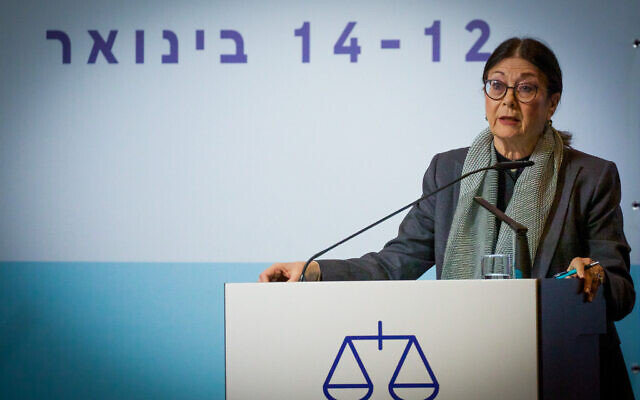As Prime Minister Benjamin Netanyahu and his new hardline government pursue sweeping changes to the judiciary that will remove nearly all High Court tools for oversight of the government, a clip from over 10 years ago where he gives a rousing defense of a “strong and independent” legal system made the rounds on social media.
The edited clip, dated February 28, 2012, shows Netanyahu hailing an independent court system as one of the foundations of democracy in a speech at a handover ceremony for Supreme Court chief justices, held at the President’s Residence in Jerusalem.
Posted on social media on Friday, the clip has now been viewed over 140,000 times in less than a day.
“I believe that a strong, independent court allows for the existence of all other institutions in a democracy,” Netanyahu said in his speech.
“I ask that you show me one dictatorship, one undemocratic society, where a strong independent court system exists. There’s no such thing,” Netanyahu said.
Get The Times of Israel's Daily Edition by email and never miss our top stories
“In places with no strong and independent court system, rights cannot be protected,” he said.
צפייה חובה.
מסכימים עם מה שנתניהו בעצמו (!) אומר?
רטווטו כדי שכולם יידעו שגם הוא מת לבוא להפגנה pic.twitter.com/gal4CCHj1v— ???? תומר אביטל (@TomerAvital1) January 13, 2023
“In fact, the difference between countries in which rights are only on paper and those in which there are actual rights — that difference is a strong, independent court,” he said.
Netanyahu went on to detail the actions he said he had taken to protect the independence of the judicial system.
“This is the reason that I am doing and will continue to do, everything I can to protect the court system [so that it remains] strong and independent,” he said.

The new head of the Supreme Court Chief Justice Asher Grunis (2L) President Shimon Peres (C), outgoing chief justice Dorit Beinisch and Prime Minister Benjamin Netanyahu (R) pose for a picture together with other judges at the President’s Residence in Jerusalem on February 28, 2012 (Miriam Alster/FLASH90)
The premier said that while there had been attempts to weaken the independence of the judicial system — some of them the very same, or similar to, changes he is promoting now — he had made sure they were not enacted.
“Over the past few months alone, I have shelved every law that threatened to harm the independence of the system — from the attempt to hold hearings for judges in the Knesset, through limiting petitions to the court, to changing the composition of the committee for selecting judges,” Netanyahu said.
“I will continue to operate this way. Every time a bill comes across my desk that could harm the independence of Israeli courts, we’ll take it off the table,” Netanyahu said.
Social media users quipped that Netanyahu’s 2012 speech could be used as the keynote for the mass protest on Saturday evening in Tel Aviv, where demonstrators plan to take to the streets for the second consecutive weekend to warn against the government’s plans.

Protesters rally against the government’s judicial reform plan at Habima Square in Tel Aviv, on January 7, 2023 (Avshalom Sassoni/Flash90)
The contentious overhaul announced by Justice Minister Yariv Levin with Netanyahu’s backing, will grant the government total control over the appointment of judges, including to the High Court, severely limit the High Court’s ability to strike down legislation, and enable the Knesset to re-legislate laws the court does manage to annul with a majority of just 61 MKs.
Critics of the plans, which include top current and former judicial and legal officials as well as Netanyahu’s political rivals, say the overhaul would put basic civil and minority rights at risk by severely limiting the top court’s authority to strike down laws and government decisions. Proponents of the changes argue that the courts have assumed excessive powers and issued rulings that defy the will of the voters.
Supreme Court Chief Justice Esther Hayut warned on Thursday the overhaul’s enactment would deal a “fatal blow” to the country’s democratic character.
In her remarks, Hayut said Levin’s planned changes amounted to an “unrestrained attack on the justice system.”
The proposals would “crush the judiciary,” she said, and change Israel’s democratic identity “beyond recognition.”

President of the Supreme Court Esther Hayut speaks at a conference in Haifa on January 12, 2023. (Shir Torem/Flash90)
Hayut’s position has been echoed by top former legal officials. Earlier Thursday, in an unprecedented move, almost all the attorneys general and state attorneys since 1975 signed a letter decrying the plan, saying it “threatens to destroy the justice system.”
In a video statement response on Friday, Netanyahu argued that the right wing “discussed this before the elections and we received a clear mandate from the public for this.”
Coalition officials say they aim to get the entire legislative package passed into law by the end of the current Knesset session.


